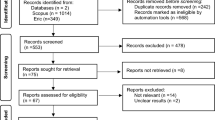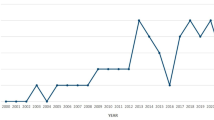Abstract
Learning Objects offer flexibility and adaptability for users to request personalised information for learning. There are standards to guide the development of learning objects. However, individual developers may customise these standards for serving different purposes when defining, describing, managing and providing learning objects, which are normally stored in heterogeneous repositories. Barriers to interoperability hinder sharing of learning services and subsequently affect quality of instructional design as learners expect to be able to receive their personalised learning content. All these impose difficulties to the users in getting the right information from the right sources. This paper investigates the interoperability issues in elearning services management and provision and presents an approach to resolve interoperability at three levels.
Similar content being viewed by others
References
ACM, ACM Computing Classification System, 1991. http://theory.lcs.mit.edu/~jacm/CR/1991/TOP.html.
A. Bednar, D. Cunningham, T. Duffy, and J. Perry, “Theory into practice: How do we link it?” in G. Anglin (ed.), Instructional Technology: Past, Present, and Future, Libraries Unlimited: Englewood, CO, 1995.
T. Berners-Lee, Weaving the Web, Harper San Francisco: San Francisco, 2002.
T. Berners-Lee, J. Hendler, and O. Lassila, “The semantic web,” Scientific American 284(5), 2001, 34–43.
Cisco, “Cisco reusable learning object strategy: Designing and developing learning objects for multiple learning approaches,” 2003. http://business.cisco.com.
R. M. Gagné, L. J. Briggs, and W. W. Wager, Principle of Instructional Design, Harcourt Brace Janovich College Publishers: New York, 1992.
T. Gruber, “Towards Principles for the design of ontologies used for knowledge sharing,” Int. J. Human-Computer Studies 43, 1993, 907–928.
N. Guarino, “Formal ontology and information systems,” in The Proceedings of FOIS'98, IOS Press: Amsterdam, 1998.
M. Hamalainen, A. Whinston, and S. VishikElectronic, “Markets for learning,” Communications of the ACM 39, (6), 1996.
P. C. Honebein, T. Duffy and B. Fishman, “Constructivism and the design of learning environment: Context and authentic activities for learning,” in T. M. Duffy, J. Lowyck and D. Jonassen (eds.), Design Environments for Constructivist Learning, Springer-Verlag, NY, 1993, pp. 87–108.
IEEE, Standard for Learning Object Metadata, Learning Technology Standards Committee (LTSC), 2003, http://grouper.ieee.org/LTSC/wg12/.
IMS, “IMS Digital Repositories Interoperability—Core Functions Information Model Version 1.0 Final Specification,” 2003. http://www.imsglobal.org/digitalrepositories/driv1p0/imsdri_infov1p0.html.
IMS, IMS Meta-data Best Practice Guide for IEEE 1484.12.1-2002 Standard for Learning Object Metadata. Version 1.3 Public Draft, 2004. http://www.imsglobal.org/metadata/mdv1p3pd/imsmd_bestv1p3pd.html.
G. E. Kaiser, S. E. Dossick, W. Jiang, J. J. Yang, and S. X. Ye, “WWW-based collaboration environments with distributed tool services,” World Wide Web 1(1), 1998, 3–25.
K. Liu, Semiotics in Information Systems Engineering, Cambridge University Press: Cambridge, 2000.
K. Liu, and L. Sun, “Applying semiotics in constructivist learning,” keynote speech, International Conf on Teaching and English Translation in the 21st Century, Marco Politechnique Institute, Marco, 2002.
OASIS, UDDI Version 3.0.1 UDDI Spec Technical Committee Specification, 2003. http://uddi.org/pubs/uddi_v3.htm.
C.S. Peirce, Collected Papers of Ch.S, Peirce, 1931–1935, in C. Hartshorne, and P. Weiss (eds.), Cambridge, MA, (1960) pp 1932–35.
R. Reiser and J. Dempsey, Instructional Design and Technology, Pearson Education, Inc.: Upper Saddle River, New Jersey, 2002.
J. Robie, L. M. Garshol, S. Newcomb, M. Fuchs, L. Miller, D. Brickley, V. Christophides, and G. Karvounarakis, “The syntactic web: Syntax and semantics on the Web,” Markup Languages: Theory & Practice 3(4), 2002. 411–440.
J. Savery, “What is problem-based learning?” Paper presented at the meeting of the Professors of Instructional Design and Technology, Indiana State University, Bloomington, IN, 1994.
SCORM, “Best Practices Guide for Content Developers,” 2003. http://www.lsal.cmu.edu/lsal/expertise/projectsdevelopersguide/developersguide/guide-v1p0-20030228.pdf.
L. Sun, Y. Fu, S. Williams, and T. Sun, “e-Learning services provision and management,” Lecture Notes in Computer Science, W. Liu, Y. Shi and Q. Li (eds.), Advances in Web-Based Learning, Springer-Verlag Heidelberg, vol. 3143, p. 209, ISSN:0302-9743.
L. Sun, S.A. Williams, K. Ousmanou, and J. Lubega, “Building personalised functions into dynamic content packaging to support individual learners,” in Proceedings of The 2nd European Conference on e-Learning, Glasgow, 2003, pp. 439–448.
L. Sun and S. Williams, “An instructional design model for constructivist learning,” in Proceedings of Association for the Advancement of Computing in Education (AACE), Switcherland, 2004.
L. Sun, K. Ousmanou, and S.A. Williams, Articulation of Learners Requirements for Personalised Instructional Design in E-Learning Services, Lecture Notes in Computer Science, Chapter: W. Liu, Y. Shi and Q. Li (eds.) Advances in Web-Based Learning, Springer-Verlag Heidelberg, vol. 3143 p.424, 2004, ISSN:0302-9743.
UNSPSC, The United Nations Standard Products and Services Code., 2003, http://www.unspsc.org/.
H. Wache and H. Stuckenschmidt, “Practical context transformation for information system interoperability,” in Proceedings of the Third International and Interdisciplinary Conference on Modeling and Using Context (CONTEXT2001), 2001, pp. 367–381.
Z. Xu, Z.Yin, and A. Saddik, “A web services oriented framework for dynamic E-learning systems,” in Proceedings of Canadian Conference on Electrical and Computer Engineering, 2003.
Author information
Authors and Affiliations
Corresponding author
Rights and permissions
About this article
Cite this article
Sun, L., Fu, Y. Interoperability for Elearning Services Management and Provision. World Wide Web 8, 395–412 (2005). https://doi.org/10.1007/s11280-005-1320-3
Published:
Issue Date:
DOI: https://doi.org/10.1007/s11280-005-1320-3




